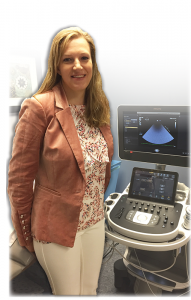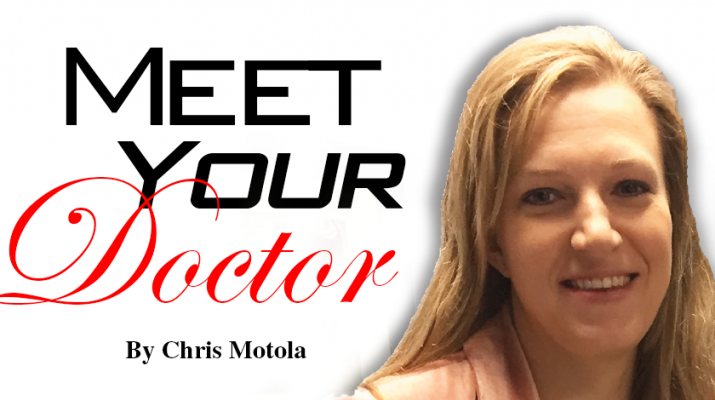Want to keep heart in good shape? ‘Diet and exercise are the biggest things,’ says new cardiologist at St. Joe’s. ‘I usually recommend the Mediterranean diet as a heart-healthy diet … and exercise 30 minutes a day’
By Chris Motola
 Q: How did you come to be at St. Joe’s?
Q: How did you come to be at St. Joe’s?
A: I’m a native Syracusan. I did my training at Upstate in Syracuse. I would say that, to me, St. Joseph’s is the heart hospital of our town, so I always wanted to practice where we had the best cardiac care. So I’d been wanting to interview at St. Joe’s. The cardiologists here are smart, easy to work with and have excellent camaraderie.
Q: What got your interested in cardiology?
A: Most doctors in training change their interest multiple times. When I first started out, I wanted to be a pediatric oncologist. When I was in medical school, the first system we did was cardiology. I took a liking to the heart. It’s a system that has so much. I love science. I like to study pathology, anatomy, physiology, pharmacology. The heart has all of that. You need to know the anatomy, how it functions, lots of medications that you have to know about. It’s pretty much everything I love about medicine in one system. There’s a lot to learn and a lot you have to keep learning. I rotated with cardiologists at St. Joe’s as a medical student and took a liking to it.
Q: What’s your typical patient profile?
A: I’d say my typical patient profile is a male between the ages of 45 and 60 years old. Their typical complaints are chest pains or palpitations. Heart attacks, heart failure, valvular heart disease, atrial fibrillation, aortic stenosis. These are some of our most common diagnoses.
Q: In addition to your previous experiences as a student at St. Joe’s what other factors weighed into your decision to practice at St. Joe’s?
A: I feel that we offer top of the line cardiac care. We have bypass surgery — for a while we were the only hospital in town that had an extensive bypass program. We do structural heart disease. We’re introducing the Watchman procedure. We have a lot of state-of-the-art technology.
Q: Do you perform surgeries yourself?
A: No, I’m not an invasive cardiologist.
Q: What should people approaching middle age do to keep their heart in good shape?
A: Diet and exercise are the biggest things. I usually recommend the Mediterranean diet as a heart-healthy diet — and exercise 30 minutes a day five days a week. And I’d say meet with your primary care doctor to monitor for diabetes, high blood pressure, high cholesterol and diabetes. Those would be your best bet for avoiding heart disease. And if you do develop a chronic condition, of course you’ll want to get it under control.
Q: What’s something you find patients either don’t know about their heart or underestimate the impact of?
A: I think people may not realize just how important your BMI [body mass index] is. Obesity is a problem. When you’re obese, you’re at higher risk for heart problems. Your weight is very important to your heart health. So it’s important to move more and eat less and make sure you have a healthy BMI.
Q: What’s your strategy for helping patients lower their BMI?
A: I tell people portion control. When you go out to eat, cut your meal in half, put half in a to-go box. Everything is super-sized in America. I also tell people to get into an exercise routine. When the weather’s nice, walk. I like to ball room dance. I try to find what patients like to do and add a healthy touch to it. When it’s something they like to do, they’re more likely to be able to work it into their routine and be more successful at losing weight.
Q: I’ve talked to a few physicians who were talking about ways and strategies for “prescribing” exercise. One actually went so far as to get personal training certification.
A: As an osteopathic physician [D.O.], my medical training is a little bit different. We’re taught to approach the patient as a whole, so we learn about muscle strengthening and alignment. So we have stretches and exercises that I show patients in the office. But cardio activity is really the most important. I can’t really show them how to do that in the office, but I can recommend activities for them to try. I can also send them to physical therapy for evaluation and therapy.
Lifelines
Name: Theresa J. Waters, D.O.
Position: Cardiologist at St. Joseph’s Medical Center
Hometown: Syracuse
Education: Lake Erie College of Osteopathic Medicine; Albany Medical College (internal medicine internship and residency); SUNY Upstate (cardiology fellowship program)
Affiliations: St. Joseph’s Medical Center
Organizations: Camp Good Days and Special Times; American College of Cardiology, American Medical Association
Family: Husband, one son, one daughter
Hobbies: Ball room dancing, golf, boating, church

